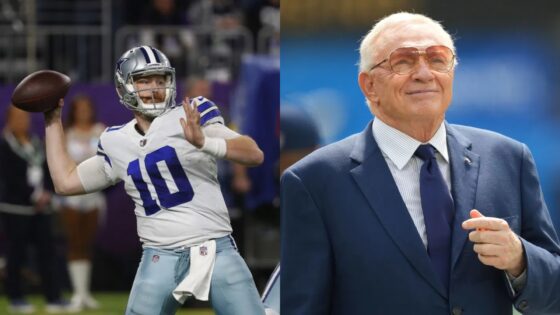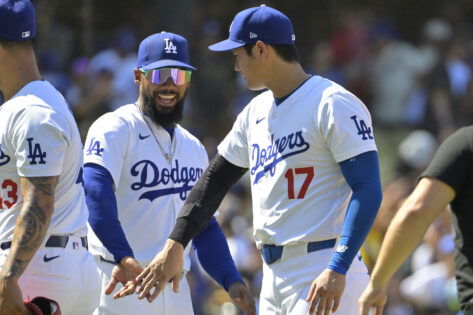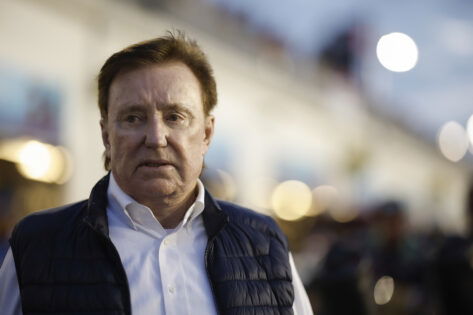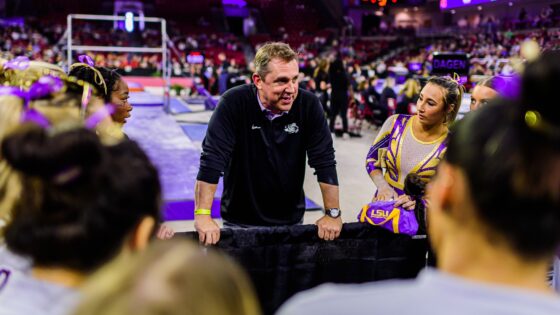Jerry Jones has a talent for converting contract gossip into folksy one-liners. But his comment on Cooper Rush‘s missed incentives slices a little too close to the truth. Earlier, when asked about Rush failing to reach his performance bonuses. Jones shrugged and said, “I didn’t even know about it. I didn’t even know about it until I read about it.” It sounded like a careless aside at first glance. Underneath it, the comment had the type of subtext that drives Dallas‘ offseason narratives. The same subtle tension that has players and agents reading between the lines these days, just as those who came before for over three decades now. For Rush, however, the reaction was measured, almost deceptively placid.
“I mean, it’s, you know… business,” Rush said in response to a question about how he felt about Jones’ actions. “If I played better, go out there, I don’t know… but, uh, no, you don’t really think about that stuff. I had a great time there. Awesome eight years, like I said. Really close with a lot of people in that organization, so it’d be cool. Thanks, guys.” The low-key response from Rush was a stark contrast to the style of Jones’ comment. It truly displayed a quarterback who appears to value insight over theatrics. But the underlying narrative is obvious. Jones’ management of incentives/contracts and communication with his players is still a hot topic.
The announcement that Rush would depart Dallas without meeting his performance goals caused shockwaves in the locker room. The lost bonuses are a standard aspect of contract arrangements. But in Dallas, each bonus has an added symbolic significance. Jones’ confession that he was not monitoring the bonus himself only served to fuel discussion regarding the org culture. The contrast between the human work and the business management left everybody else reading between the lines of the Cowboys’ internal machinery.
Rush’s reaction also solidifies the quarterback’s image as one who doesn’t burn bridges or ruminate about what might have been. Through his positive experience and camaraderie within the organization, Rush indirectly revealed a disconnect between player loyalty and management focus. Within a franchise criticized for an owner-centric approach too often, the moment reifies the understated professionalism of a player operating within the politics while remaining intent on the game. Rush’s remarks speak to a player who is mindful of the business world. But also suggest the type of owner-player alienation that might inform future negotiations.
In the near future, the Cowboys’ handling of incentives and communication could have a real-world effect on team morale and roster stability. Though Cooper Rush’s exit may not rattle the immediate quarterback depth, it sends a message to other players, from established veterans to newcomers, that performance incentives (read: money matters in general) are uncertain in Dallas.
In a franchise pursuing both divisional supremacy and a Super Bowl window, trust in leadership is as important as plays called on the field. With Micah Parsons’ contract drama already being scrutinized. Jones’ loose handling of incentives might inject subtle tension among the locker room’s key contributors.
Cowboys owner’s shortcomings
When asked what is different since coming from Dallas. Cooper Rush considered the distinctive stress and tempo of the team. “Of course, football’s a big sport here in Dallas. Uh, the chase a little different here and the atmosphere and the cover… yeah, I mean, depends how you look at it down there. But no, I’ve been really enjoying it,” he replied. Superficially, the remarks are regarding adjusting to Ravens. But they also suggest the difficulty of dealing in a world where ownership has a large influence on football matters.
In Dallas, the head coach is working under the shadow of Jerry Jones, who traditionally makes the important decisions on personnel and strategy. Rush’s comments quietly point out that. Despite what players are viewing in a well-coached, talented staff, much of the operational control actually falls to the owner and not the coaching staff.
Sep 26, 2022; East Rutherford, New Jersey, USA; Dallas Cowboys quarterback Cooper Rush (10) throws during the second half against the New York Giants at MetLife Stadium. Mandatory Credit: Brad Penner-USA TODAY Sports
Rush went on to point out the best of his experience, the facility, the locker room environment, and the professionalism of the coaching staff. “This facility is amazing. Getting to see this and being around a team that you’ve always seen from afar having success… now you see why. Well-coached, great locker room, leadership, things like that, and a lot of talent,” he said. Although acknowledging the organizational positives, his words also highlight a contrast. The subtle criticism is in recognizing that players’ hard work and coaching game plans are sometimes circumvented or passed through Jerry Jones’ judgment, pointing to a structural flaw in the team’s hierarchy.
This dynamic influences the way players experience their jobs and the general climate of the franchise. Incentives, play-calling, and career development are all affected by a system in which the owner continues to be heavily engaged in football operations. For players such as Rush, this can make success feel somewhat hemmed in by forces outside the game. While the roster excels in public opinion, the back-end organization reveals weaknesses in operating independence, communication, and coherence. A reminder that even an elite roster has to work around the intricacies of a front office that holds extraordinary power.
The post Cooper Rush Clears Feelings on Jerry Jones’ Dirty Tactics After Exposing Cowboys Owner’s Shortcomings appeared first on EssentiallySports.



